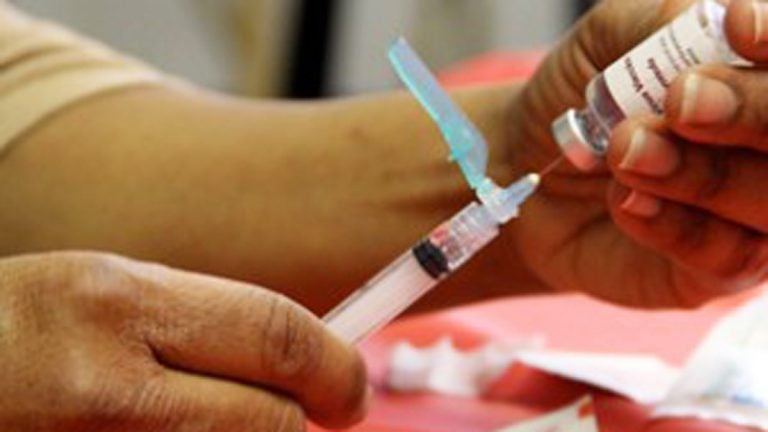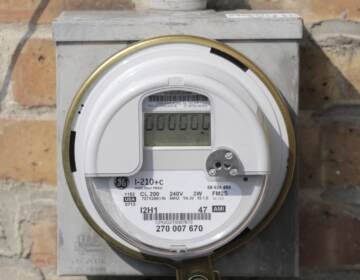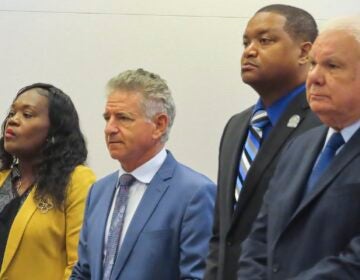NJ could make it harder to opt-out of vaccines

More and more New Jersey parents are citing religious exemptions as a way to keep their children from being vaccinated, and state legislators are seeking to head off the trend before it grows.
Lawmakers want to have parents looking to opt out from the statewide vaccine mandate submit a statement swearing that inoculations violate their religious beliefs. They claim that this would save children’s lives. It would also roll back the state to the status quo before a 2008 rule change made it easier to avoid vaccinations on religious grounds.
But opponents of S-1147 argue that it’s unconstitutional, restricting the religious freedom of those who don’t want their kids to receive vaccines.
They also claim that vaccines are unsafe, a position that has grown in popularity in recent years but which is rejected by the medical consensus. Religious and medical exemptions are the only ones allowed under state law.
The bill would require a student’s parent or guardian to submit a statement that explains how vaccinations violate a family’s religious beliefs; includes information on how they’ve consistently held those beliefs; details that these beliefs aren’t solely based on nonreligious grounds, such as concerns about the safety of vaccines; and indicates that they understand the child may be excluded from school if a disease occurs.
The percentage of New Jersey students claiming religious exemptions has risen from 0.4 percent in the 2007-2008 school year to 1.7 percent last year. Interest in the issue spiked recently following a national outbreak of measles — including two cases in New Jersey – and after Gov. Chris Christie said parents must have a “measure of choice” regarding vaccines, a statement that drew criticism from medical experts.
Bill sponsor Sen. Joseph F. Vitale (D-Middlesex) said the point of the measure is to ensure that exemptions are based in bona fide religious beliefs, not to judge people’s religions.
“I believe all vaccines are safe and necessary, unless there’s a medical reason not to have one,” Vitale said at a hearing on the bill yesterday. He expressed concern that if the current trend grows, preventable, deadly diseases would become widespread.
“We’d live in the dark ages pretty soon,” he said.
But Morris County resident Yelena Korchman said she knew of a case of a baby dying after receiving a vaccination — an event that vaccine proponents say is exceedingly rare. She questioned what would happen if her statement isn’t accepted by her local school board.
“What am I supposed to do? Home-school? Is that my only choice? And what about low-income individuals that can’t have that choice?” Korchman asked.
She said that the bill requires that the religious beliefs be consistently held, but noted that some people’s beliefs may differ depending on the vaccine, such as those developed with aborted fetuses.
Bill opponent Sonia DaSilva said, “The government does not have the right to decide if my reasons” are moral or religious. “Who will decide what constitutes a bona fide belief?”
She said pharmaceutical companies have suppressed or ignored data that some vaccines aren’t as safe or effective among African-Americans.
“Why are we still allowing the targeting or disparagement of certain religious or racial groups in this country?” she said, later adding: “Putting the state in a position to determine how deeply religious a person may be is deeply troubling and I believe it to be a violation of our constitutional rights.”
Drew Harris, the director of the masters of public health program at Thomas Jefferson University in Philadelphia, said the bill “just turns back the clock” to the way things were before 2008. At that time, parents were required to say that their religious beliefs were “bona fide.” Since local health officials implemented this rule, it was applied differently across the state.
But requests for details about families’ religious beliefs were dropped in 2008, after the attorney general’s office advised health officials that they couldn’t ask for that information.
“It’s easier to get an exemption than it is” to receive a vaccine, Harris said. He compared asking about religious beliefs to the government’s ability to ask those who were drafted into the military and sought conscientious objector status whether their beliefs were sincerely and consistently held.
“We need to recognize that people are misusing that exemption process,” to avoid vaccinations based on personal rather than religious reasons, Harris said.
Sen. Dawn Marie Addiego (R-Atlantic, Burlington, and Camden) asked Harris whether the state has seen an increase in diseases targeted by vaccines since the number of religious exemptions went up.
Harris said there have been cases of vaccine-preventable diseases, but there hasn’t been an increase that paralleled the rise in exemptions.
“Are we going to wait for the disease to come in and suddenly wake up and realize that we need to vaccinate people?” he said. He added that an outbreak could require large-scale quarantines of unvaccinated children, which would lead to high costs for the state to provide homeschooling.
Dr. Wayne A. Yankus, a pediatrician, told bill sponsors that he was “delighted that you have the boldness to put this forward.” He said the state wouldn’t necessarily be able to handle a widespread measles outbreak like California recently had.
“Parents have no right to martyr their children in the name of religion,” he said.
Later in the hearing, Korchman responded: “my God did not empower me to martyr my child for the sake of a greater good.”
Another pediatrician, Dr. Jeanne Craft, described the case of patient who died from a meningococcal infection before a vaccine was available for the disease. She said children should follow the recommended vaccine schedule, unless there was a medical reason not to. This protects not only themselves but also those who can’t receive a vaccine for medical reasons. She noted that vaccine opposition rose after a fraudulent paper — later retracted — was published in the British journal The Lancet that linked the measles, mumps, and rubella vaccine with autism. The Centers for Disease Control and Prevention cites multiple studies that found no link.
“Everyone who can be vaccinated should be vaccinated: These diseases kill children,” she said.
But opponents rejected the case made by the pediatricians.
Louise Kuo Habakus, who’s written a book critical of vaccines, said the bill was a step toward turning New Jersey into a “police state.” She added that asking people about their religious views wouldn’t stop them refusing to vaccinate their children.
“People will not vaccinate if it violates who they are,” she said, adding that she instead called for the pharmaceutical industry to make better products.
Sen. Jim Whelan (D-Atlantic) said this suggests that people are violating the law, “when they’re saying it’s religious and it’s not.”
Glen Rock mother Becky Fogarty said the bill seems to suggest that only those who adhere to the doctrines of a religion would receive the exemption. She said she isn’t part of an organized religion, but her opposition to vaccines stems from her relationship with a “higher authority, with my God.”
Chiropractor John Marelli also rejected medical claims that vaccines have eliminated diseases. He cited the example of polio — which was eliminated in the United States but still exists in other countries. He said polio is now known as “flaccid paralysis,” which is a condition caused by polio and other diseases. He described herd immunity — a key concept in public health that holds that vaccines are more effective when a high percentage of the population is immunized — as a “fairy tale.”
The Senate Health, Human Services and Senior Citizens Committee released the bill on a 5-2 vote yesterday, with Addiego and Sen. Ronald L. Rice (D-Essex) voting against it and the other five Democrats present voting for it.
___________________________________________________
NJ Spotlight, an independent online news service on issues critical to New Jersey, makes its in-depth reporting available to NewsWorks.
WHYY is your source for fact-based, in-depth journalism and information. As a nonprofit organization, we rely on financial support from readers like you. Please give today.




